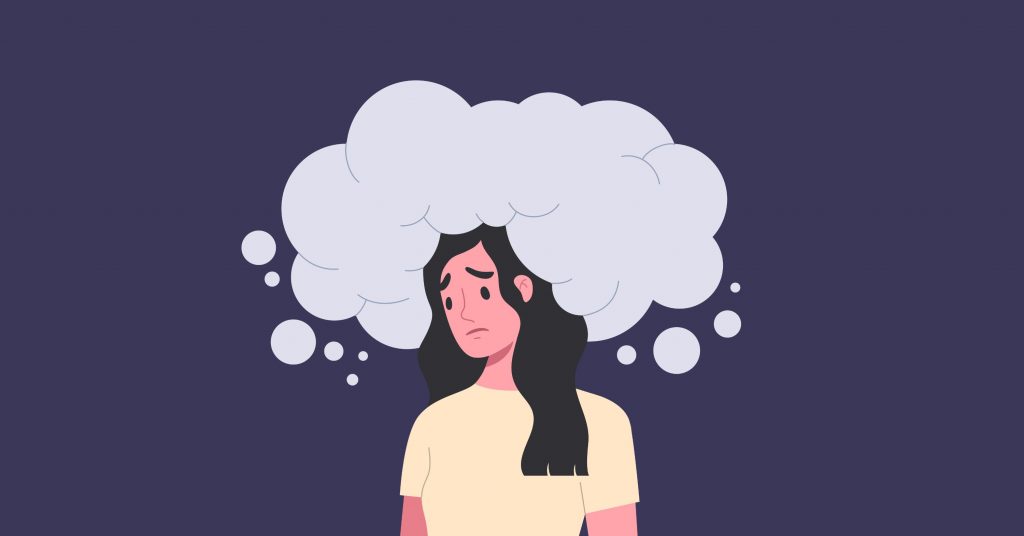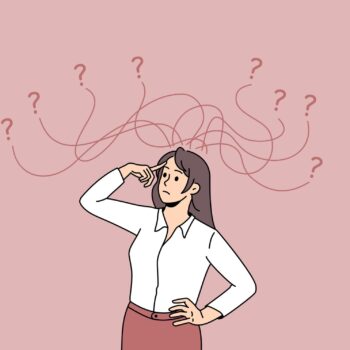How Pre-Existing Grief Assumptions Can Make Grief Worse
/ Understanding Grief : Eleanor Haley
You don't know what it's like to grieve for someone significant until you're in the depths of it. I think most people can agree with me on this. It's one of those experiences you can only know once you get there, which makes it all the more intimidating.
That said, it's common for people to have ideas about what they think it's like. From our first exposures to loss, we naturally begin to build a conceptualization of what we believe grief must be like. And, depending on what we've observed and learned, our assumptions can run the gamut from relatively true and accurate to flat-out grief myths.
Where do our assumptions about grief come from?
People don't sit down, crack open a book, and say, "Today I'm going to form my attitudes about grief" Rather, our attitudes and beliefs about loss, along with countless other human experiences, start to take shape at an early age.
As humans, we acquire much of the knowledge we have about the world and the people in it through observing others. Observational learning isn't as intentional as, say, deciding you want to learn how to knit or take surfing lessons. Instead, you're often learning through observing without even realizing it.
This kind of learning is extremely useful but has limitations because it can sometimes lead to incorrect assumptions about people and experiences. You may be especially likely to form an incomplete or inaccurate picture when something is as complex as grief.

Incorrect assumptions about grief
Many people cite television or movies as their first exposure to grief and loss. Thanks, Disney and Pixar! In all seriousness, we love many of the grief-centric stories that we've seen in kid's media. But unfortunately, even the best representation of grief is often abridged, oversimplified, and sometimes overdramatized. So these views may be limited and two-dimensional.
What about having a more personal connection with someone who's experienced loss and grief? Theoretically, you would develop a more nuanced picture of grief by being around this person. But even then, you can only learn based on what this person is showing and sharing, and, as many grieving people will attest, the outside world often knows only the tip of their grief iceberg.
Finally, let's pull back and look at the bigger societal picture. What messages does our society send us about grief and loss? Unfortunately, grief myths are pervasive in our societal understanding of life after loss and include the ideas that grief follows a set of stages (it does not), ends in a place of acceptance (grief does not have a finite endpoint), and requires a person to "let go" of the past and the person who died (no and no).
How do assumptions about grief impact the experience of grief?
People often feel frustrated by the pressures others put on them when they're grieving but overlook the unfair pressures they put on themselves about how they "should" be grieving and coping. One main reason a person might assess themselves as doing things wrong is that they've entered the experience with assumptions about how things will be, only to find they're far different than they imagined. And rather than labeling their preexisting beliefs wrong, they label their own experiences and responses as abnormal.
"Why would anyone do that to themselves?" you might ask.
Well, turns out humans are pretty protective of their fundamental assumptions about the world. And they will try and try again to fit their experiences into their preexisting framework before stepping back and saying, "Okay, I need to adjust my understanding of this."
One's assumptions may also lead them to believe specific rules are at play about how to grieve. For example, a person may assume, based on what they've seen on television or been told, that the standard way to grieve is to express emotions and talk about their feelings. Of course, the idea that there is a right way to cope is a grief myth, but someone who doesn't know this may assume they must talk it out and ignore other grief-coping outlets that are a better fit, or feel beyond help when they don't want to go to therapy or a support group.
So what can you do?
The logical next question is, how do you ensure that your assumptions about grief aren't causing you to put undue pressure on yourself or boxing you into rigid ways of responding and coping? The first and simplest thing a person can do is learn what is and is not true about grief.
We've written a few articles about grief myths and truths:
- 64 Myths About Grief that Just Need to Stop
- The Myth of the Grief Timeline
- Grief Never Ends and That's Okay
- Grief Emotions aren't Good or Bad, They Just Are
- "I Don't Want to Talk About It" Coping With Grief Without Saying a Word
- Why do People Think we Move On After a Death?
After learning about grief myths and truths, we suggest that people take a little time to examine the assumptions they've likely internalized and brought with them into the experience because there can be a disconnect between knowledge and our deepest beliefs. For example, someone can intellectually know that there isn't a timeline to grief but still feel embarrassed or wrong when they go through a difficult grief patch years later.
Ask yourself:
- How do your pre-existing assumptions about grief impact you?
- Which assumptions serve you and which do not?
- What myths and assumptions do you fear are most ingrained in you?
- Which myths feel the most challenging for you to shake?
- What new information about grief and life after loss do you want to integrate into your understanding and keep at the forefront of your mind?
Finally, when you notice a grief myth or assumption coming up to make you feel like you're doing things all wrong, we want you to say, "NOPE, I'm not having it!" Picture yourself opening a window, or open an actual window, and throw the assumption O.U.T.
Permanently file this belief under things you used to believe, but now you know better. And the next time you hear someone saying something to the contrary, share your experience with them so they might form their own assumptions a little differently.
What assumptions have you noticed getting in your way? Share in the comment below
We wrote a book!
After writing online articles for What’s Your Grief
for over a decade, we finally wrote a tangible,
real-life book!
What’s Your Grief? Lists to Help you Through Any Loss is for people experiencing any type of loss. This book discusses some of the most common grief experiences and breaks down psychological concepts to help you understand your thoughts and emotions. It also shares useful coping tools, and helps the reader reflect on their unique relationship with grief and loss.
You can find What’s Your Grief? Lists to Help you Through Any Loss wherever you buy books:





Dean burnell May 17, 2023 at 11:15 am
I recently had sad news from someone who was my work colleague for about 3yrs and we stay in touch via text as friends during the past 6 yrs. she is in her late thirties and her boyfriend since she was in her early twenties has died suddenly in his sleep..a fit guy, sporty, seemingly healthy lifestyle. She tells me about how lost she feels and that nothing makes sense. He was her everything and vice versa. I try my best to be supportive, not wanting to cross any lines as we are not bosom buddies but of course I care that her wellbeing is ok. I have had bereavements in my life but not a partner and I I,agine that brings a slightly different feeling then when it’s a grandparent…just like losing a parent, even if they have been sick must be dreadful……the people who have been with you all your life are no longer there….it’s kid of like a big rejection except they didn’t mean to do it
It’s not fair 2hat has happened to my friend. Yes we all die but why be given life to have it taken away again,..it’s not how it should be….though I once saw on a tv show, THE GOOD PLACE and the character says that death is what gives life so much more meaning. That we are all partially sad all the time because we know that this has to end for all of us…would be be better if we alll knew that 90yrs old was the end point.
..is a sudden death easier or harder to deal with
As support givers, we are placed in a delicate situation of how best we offer that support but I have learned from reading your articles Eleanor that there isn’t a set way of doing things. I guess whatever I write will hopefully mean something because I have made the effort to show I am thinking of her. Cos she will be feeling lonely for sure, no matter how many people are around her in these days…that thing that the person who “gets you” is gone…i am reluctant to say things that might sound cheesy but the thing is that if you have a solid friendship, the person will just feel comforted that you held out your hand..cos some people will maybe feel too awkward and keep a distance….bu that makes it easier for you and not the sufferer. Kindness…that precious thing
Stacie Paulsen April 20, 2023 at 11:34 am
I lost my husband of 42 years in January 2022, 8 months after his pancreatic cancer diagnosis.
Being his caregiver during Covid was isolating and lonely and scary. I drove the 5-hour round-trip each week for his clinical trial. He was (not unreasonably) very risk-averse during that time and I supported that choice. But it meant friends and family were restricted in visiting and in helping.
I dealt with the details of our day-to-day life and his illness while he continued to teach his university classes virtually.
Teaching kept him busy and distracted and feeling normal.
But I had just retired and was at loose ends much of the time. The usual advice for caregivers was not applicable during lockdown. There was no respite care, no getting away for a bit. I was comfortable meeting friends now and then to spend an hour hiking in the woods, so I got out now and then. I talked on the phone daily with friends and our kids.
But I was frightened and lonely and he was not communicating with me. I felt resentful and angry and somewhat abandoned. It was very hard and I begged him to talk to me and share his feelings.
When he died I expected to feel relief that this excruciating experience was over. But what I felt was overwhelmingly alone.
Gone was the person I met at 18 and had grown up with; the person who knew everything about me; the one I talked to and relied on for advice; the one who encouraged me and believed in me; my playmate, the one who shared my in-jokes and interests, was gone.
I was certain that life had no meaning and I had no purpose. How could I enjoy things without him? How could I build a life for myself when I had no idea who I was?
I do have four wonderful adult children who are and were loving and supportive and generous with their time. I do have a network of loyal and unfailingly diligent friends who did so much for me.
And yet I was angry and felt alone and was repeatedly appalled by how some people spoke or acted. Intellectually I knew that it’s hard to know what to say or do but in the moment I felt that 75% of people unerringly said or did the wrong thing. Mind you, I wasn’t always able to tell them what would be right. Even when I did, they often did not listen.
An example: One or two people were allowed to visit us masked and outdoors for an hour. But then someone would suggest I go to a movie with them as a distraction. I saw red and would explode. How could they imagine that I could do that during Covid when my spouse was so vulnerable?
During his illness, I asked my therapist if I would ever be nice again. She said yes, but not yet and gave me permission to be unfiltered and egocentric (my words). It was a new experience to just blurt things out without weighing the effect on another person. And it helped me analyze how I was feeling and identify what works for me.
After his death, I joined a small group of grieving spouses and hearing them speak of their experiences and feelings was extremely helpful. It showed me that everyone’s journey is unique and put my experience in perspective.
A friend just lost her husband rather suddenly. He had a chronic condition but a routine procedure went awry. Now I find myself in the very challenging position of wondering what to say and how to help.
I do know that
* “i hope that you will find comfort in memories of happy times together” or
* “you will be in my thoughts and prayers” or
* “please let me know what i can do” or
* “here is yet another casserole to put in your freezer because it’s far more than one person can consume”
will never come out of my mouth again.
But what does this person need in her time of loss and need? I thought I would be a pro by now, but different personalities and different circumstances require tact and thoughtfulness.
My take away from the past two years is that life is not a Hallmark movie. And I do now watch TV and movies and read books with a completely different point of view.
Because in my experience, sick people do not suddenly share their fears, thoughts, regrets, or apologies and they do not counsel you on how you should live your life when they are gone.
Caregivers do not find a wealth of patience and infinite kindness buried within.
You do the best that you can in the best way you know how. And the hell with expectations, both your own and other people’s.
Ann April 12, 2023 at 5:19 am
I am here to grieve not a person -because he is alive -but a friendship that I wished and we both promised would last forever. How could it ever end. We both never wanted anything from each other… I know no one trusts you when you say it was just a friendship.
why?
Because… on a normal day, not every artist meets another artist who suffers from the same illness – has failed just as badly, in art and in life – and you both promise to be friends forever, both wanting the other person to be… happy on behalf of you as well.
I did.
When KB and I saw each others’ art, we both were stunned and we both thought that we needed to be a part of each other’s story, support each other in this ‘not-so-easy-art’s journey’…
We wanted to be with each other because we shared depression and anxiety… imposter syndrome and bouts of complete emotional numbness.
We knew my family had made the mistake -of assuming us to be lovers. We weren’t. I know he was married and he knew where my heart was.
But…
Didn’t help.
We struggled terribly hard to keep the friendship -using different accounts and names. 4000 miles of land, cultural differences, his job, our illness could not stop us from being friends for over 2 years.
I asked him sometimes ‘Would you remember you had a depressed traumatized friend when they manage to cut off our conversation?’
He… tired from all day at office would reply back to me across 4000 miles of land : ‘I shall remember. Even if you returned years later. I would’
‘If they make me cut off from you suddenly, I will leave a last final message to you so you know I am going.’ I said.
He said ‘When you were very ill, I was afraid of you suddenly leaving but not anymore. Even if we had to stop talking, I knew you would be ok…’
Oh! The terror.
My heart jumped to my mouth. I had forgotten the time I had told him about suicidal thoughts… I was filling this conversation with laughter emojis but they still could not stop him from feeling the fear of losing a friend to mental illness.
Did I not vow that I would not lose this battle?
Did he not making me promise him I would be happy?
Did I not tell him ‘Goodbye’ almost a week ago? ‘My last message – Goodbye’
The answer to all is yes but at this moment I want to feel pain that is intense enough to make sense. 2 and a half years of acquaintance… Chats over the Instagram while he took his dogs out in another continent of the world -another time-zone. And once… out with those two naughty dogs -that he had adopted from a rescue center -he heard from me that long ago I had thought of putting an end to this.
He heard that and … I can never recreate the emotions that came up in him… so i would recreate the words he used –
‘Please, no, please. Never’
‘I NEED to be sure that if you feel that way you would tell someone. please’ (To which I asked ‘who would I tell? No one can understand.’ To which he replied -)
‘ANYONE. Anyone. If you need HELP, you just have to get it. There are NO excuses to getting HELP’
Everyone was wrong. I never loved K. I loved the way he made me feel that my life was precious and if my life-line snapped he would hate it… He would. For my life I would always remember the warmth of that moment when he fought to make sure that if I ever even thought of ending it, I would get help.
When I said Goodbye to him a few days ago, because my family would not let us talk anymore –
But…
I still expected to experience unbearable amounts of pain. It would make sense.
I had been dependent on him at some points and he had confided in me not just about his mental illness but also the physical illness – ‘ammonia poisoning in the lungs and the brain ‘ which was eating up his body.
I expected pain.
A lot of pain.
That pain does not come.
There is ZERO pain. As if we just are not talking right now. As if it is just a break and very soon we would again be talking… very soon we would again be laughing about his dogs hiding in his garage or the weather being terrible… or the global-warming or our mental illness… or just about the horrible people at my college or his work. Haha!
Even as I type this I feel like I am just WAITING for it.
I am not. I cannot.
IT MAKES ME AFRAID –
Am I losing my sanity?
Right now when I should be experiencing so much pain… I drive my best, study, write, everything. What is wrong with me. I beg for the pain…
I have had pain many a times.
I can take it. At least I would feel human.
This numbness… is more exhausting… that the actual pain. PLEASE, let me have pain! PLEASE….
I need to miss you, feel angry with you, cry, shout everything, KB. I need to grieve our friendship. I cannot bear this numbness…. I know you always wanted me to feel my emotions. That includes grief for the friendship we shared.
Julia March 31, 2023 at 11:35 pm
My mom died at age 88 on January 31st. She had been in a nursing home for 13 years, had dementia, and entered hospice in October. At the end of January, the hospice nurse notified my sister that Mama had taken a turn for the worse. I knew this was it. She was gone two days later. I thought I would feel relief, but all I felt (and still feel) was sad. During the week of the funeral, I cried so much that I couldn’t cry any more.
A week after I returned home after my mom’s funeral, my oldest brother, Kenny, died in his sleep at age 64 after a long illness. I had already cried so much about Mama, that I didn’t know how to respond. It took a couple of days before I actually cried. Kenny had also been estranged from the family for several
years. He was cremated and no funeral plans have been announced. There was always an ambiguous grief while he was alive because I was never sure where he was living.
Now it feels ambiguous because we don’t really know where his ashes will go.
I realized this week that I’m grieving all that there “wasn’t” between us while he was physically alive. He was the only one of us seven adult kids who wasn’t
at our Mama’s funeral. We had heard he was no longer able to walk. We missed him. And I’m sure he missed being there. It’s all just very sad. I feel stuck
In that gap between “what was” and “what’s next”.
I also feel like “everyone else in the world” has moved on while I am still wrapping my head around all that happened over the course of 29 days. The end of two
different eras. Both parents are now gone, and now the Kenny is the first of the siblings to die. What was a bespoke set of seven is now six.
Megan March 31, 2023 at 4:31 am
You mention that due to our own and that of others views about grief are often 2 dimensional!
You nailed it on that concept . I find that as I re-entered various aspects of my life after a period of seperation from my responsibilities in life ( work, spouse ,adult children ,church..) there is this unsaid expectation that we get over it .It’s that 2 dimensional thinking that is so ignorant . It truly makes the grieving harder because I’m expected to stuff my tragic and trauma that I had to deal with in my grieving process . Like I’m never going to be effected by the fact that my son died in my arms . It kinda makes me angry or disappointed with them that they don’t get what that has done to me . There days I just don’t want to put in a brave face and do life. Thenni come to my belief that’s because they have no clue what it’s like to walk in the shoes of one who lost there child to the grips of addiction and watched there child overdose unknowingly . Unable to revive him the paramedics unable to revive him the ER doctor d and nurses unable to revive as you stand by praying to God to revive him .
Wow the 2 dimensional mindset !
Rick Elliott March 30, 2023 at 5:25 pm
Thank you for all you do for all of us that are going through this grief process. I lost my wife suddenly 8 months ago. I have went through 1 on 1 counseling as well as a group support of 8 weeks.
The shock of the loss is still, and probably will, always be with me. My grieving is something that totally dominates my day as I find it hard to focus on anything else.
I have learned, through counseling, that each person’s grief is unique to them. This does help me not to stereotype my grief. I remember hearing that ” You must live through it to get through it.” I feel that this is definitely true. I know i will always have grief and sadness in my heart, but I’m trying hard to rely on all the good memories my wife and I made together.
We were married 31 years and my wife Carol was 62 when she passed. I do anything and everything that I think can give any amount of comfort, including share my experience on here.
Thanks for your time.
Mary March 30, 2023 at 12:51 am
I wrote to you about eight or nine months ago about my son dying of cancer in another state and his request for me and his children not to visit him. For five years I grieved that my son would die of cancer, the grief was full of anxiety and I didn’t think I could feel any worse. It has been six months this month March that he died and I was wrong, while the anxiety is gone it has been replaced with a deep aching wound and disbelief that my child has died. I feel incomplete and I want to run away, but where? Everything in my surroundings remind me of him and yes they are beautiful memories but full of pain. I cannot listen to music or look at art and many other activities that we shared without the sinking feeling and then the fact he is no longer here. There are times I really do not want to be here in this world and the feeling eventually subsides. I cry as much as I did when he was ill but now it is without any hope and with the knowledge this empty space can never be filled. I don’t know how I will feel at the end of the year, right now I am taking baby steps in the dark hoping that there will be relief of some kind in the future. I don’t know what to expect but I keep waiting for the darkness to lift. I have experienced may losses in my life but no loss is greater than the loss of a child no matter how old they are.
Eleanor Haley March 30, 2023 at 12:01 pm
Oh Mary, my heart aches for you. Having connected with you on and off, I know you have been through so much. I’m so sorry for the ongoing pain you’re now having to navigate. I don’t know what it’s like to lose a child, but I do believe it must be just incredibly painful. I wish my words could bring you comfort, but I know you need more than words. Do you have any grief support outlets in your community that you access? Maybe a support group or someone you can talk to one-on-one? There are some support groups specifically for bereaved parents if you want a recommendation. I know you said that moments where you’ve felt you didn’t want to be here have passed – but if you ever find that isn’t the case, or if you ever just want someone to talk to one-on-one in the immediate – please know you can always call the crisis lifeline at 988. I will be thinking of you.
Nancy March 30, 2023 at 12:07 am
Some assumptions that I have — if you’re not crying you’re not grieving — I feel guilty if I’m not sad. And that things will get back to normal — how can that ever happen?
I lost my husband in 2020 to cancer. I lost my sister prior to that. Both happened to be 61 when they passed. Guess what? I’m 61 this year. Both myself and my sister’s kids (adults) are concerned. Luckily for everyone involved I’m in relatively good health and have no suicidal tendencies. But we’ll all be stressed out until I hit 62.
This website and the classes I’ve taken have been helpful. However, will I ever be anything but sad? My husband was my best friend. Life has lost its meaning. I have no goals. I can’t see anything ahead except acting normal and going through the motions of life. Maybe that’s all there should be. I don’t know.
Eleanor Haley March 30, 2023 at 12:11 pm
Hey Nancy – yes, thank you for sharing these assumptions – I imagine many people can relate to them. The idea that we will get back to “normal” is one that I think can take some time to grapple with. And when you eventually realize that loss has simply changed you and your life forever, I think there’s some secondary grief that people have to work through as they grieve for the life and identity they’ve lost.
Also, I’m sure people can relate to feel guilty for times when they aren’t crying or feeling sad. Something we talk to people about is how this might make sense to do if grief really were some time-limited thing that you move beyond. But because grief is something that stays with you, it’s really important to find ways to allow other emotions and other experiences to exist as you carry your loved one forward into the future. I know, easier said than done sometimes.
I’m glad to hear you’re in good health and I hope that remains so. Thank you so much for sharing your experiences.